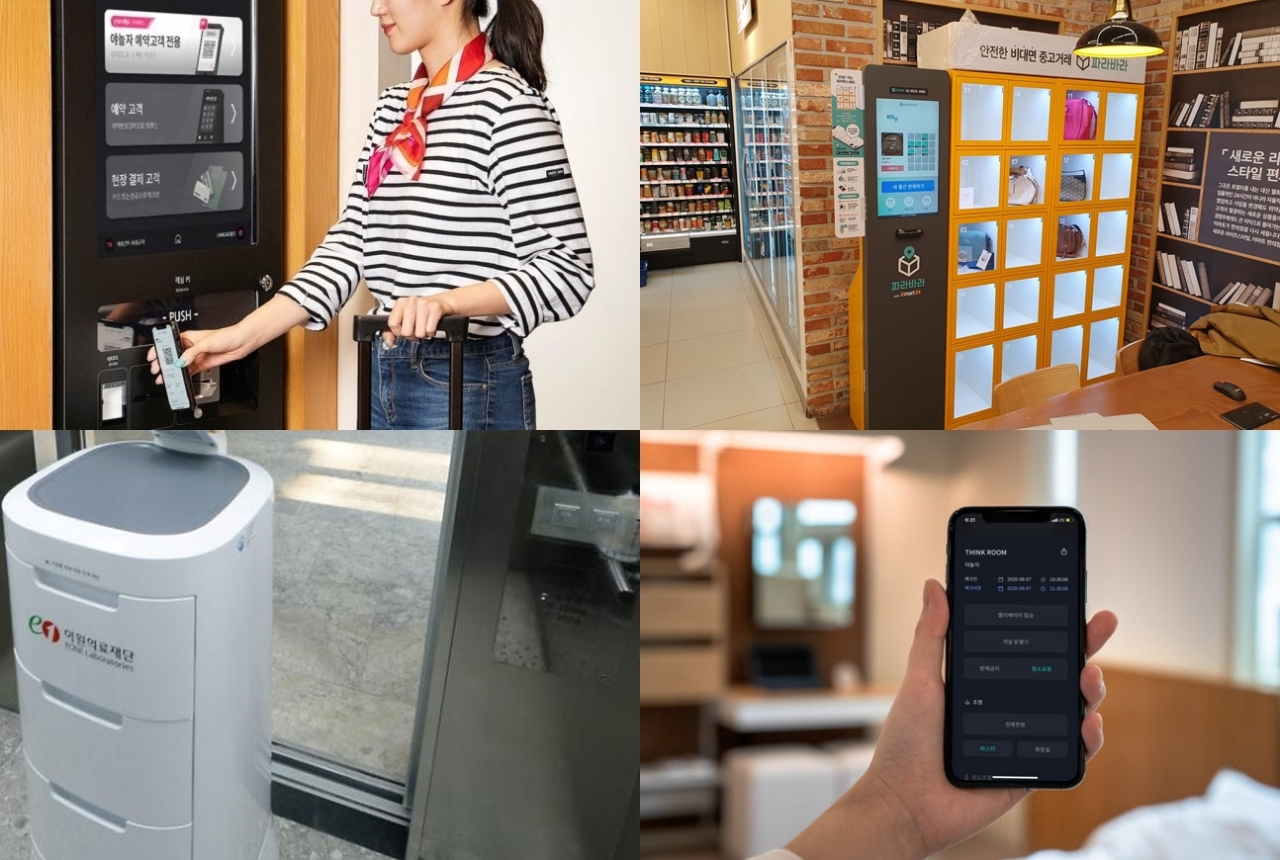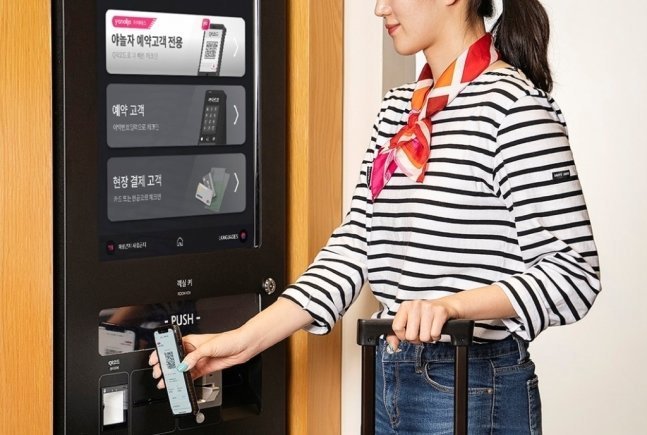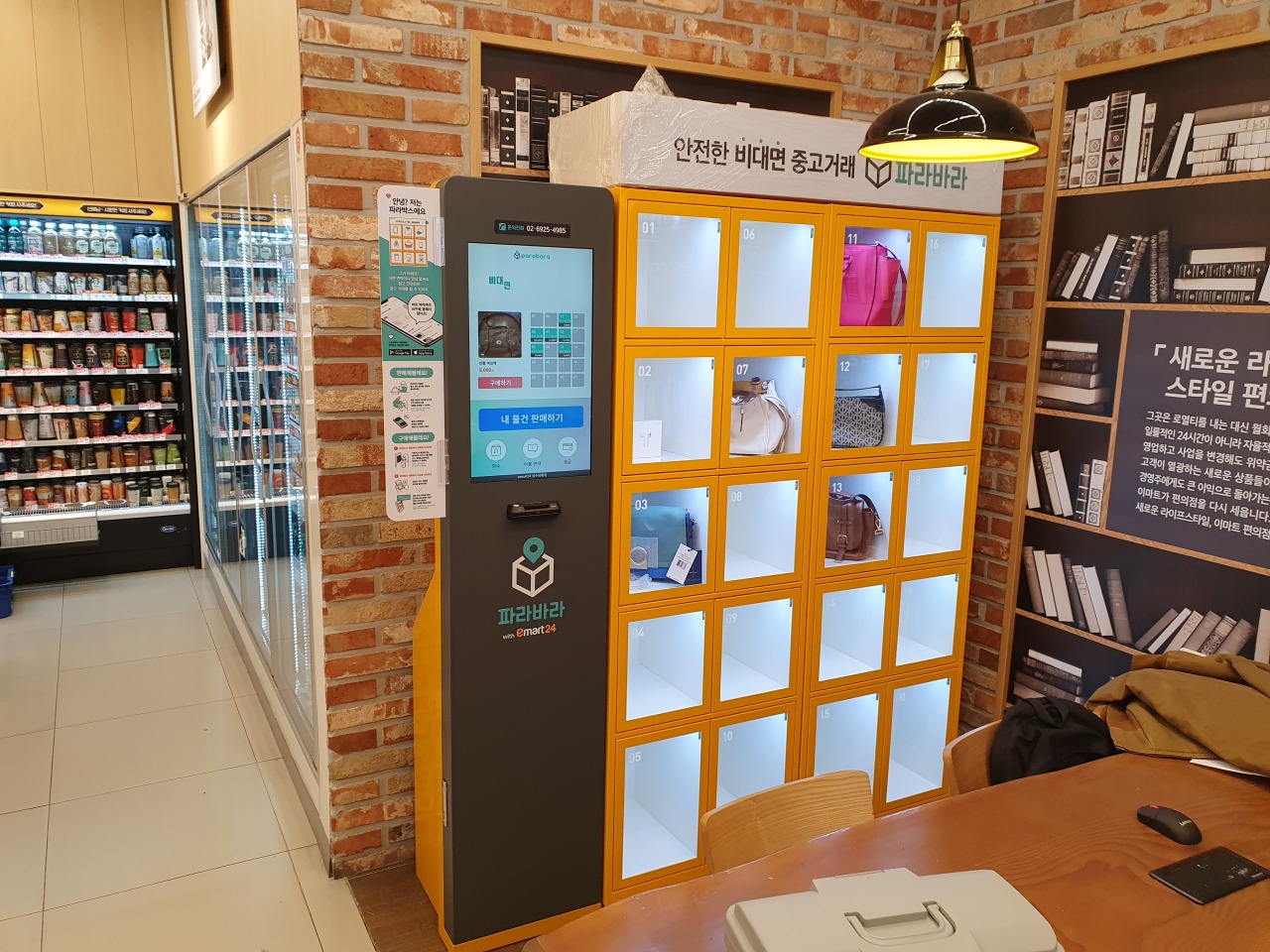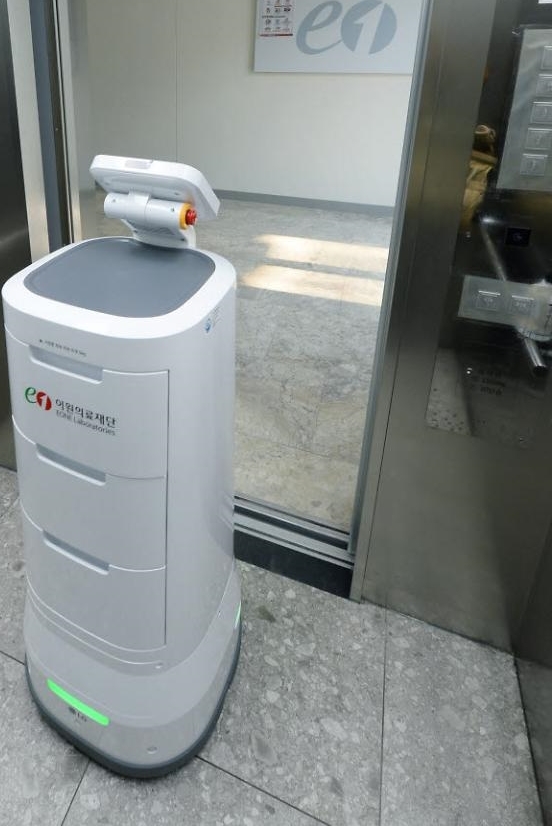[Feature] One year into pandemic, contactless businesses continue to thrive
From a cloud-based unmanned hotel service to a vending machine for trading secondhand items, contactless businesses are here to stay
By Yim Hyun-suPublished : May 12, 2021 - 14:39

Once fueled by an emphasis on social distancing and hygiene woes, contactless businesses are continuing to thrive in Korea nearly one year into the coronavirus pandemic as companies rush to prepare for the post-pandemic era.
Lee Do-shim, a 29-year-old Pilates instructor in Sejong City, is among the many who have become used to meeting basic necessities such as grocery shopping and getting takeout food without human interaction.
“After the pandemic began, social distancing became the norm and dining out became harder. So I started inviting acquaintances to eat together at home and began to use Baemin,” she said.
“I avoid going to crowded places because of the coronavirus. And when you work, you don’t have a lot of time grocery shopping. These days, I don’t go to a supermarket and I use Coupang’s Rocket Delivery instead.”
People like Lee were behind the unprecedented surge in popularity of South Korean online retailers during the pandemic. Online grocer Market Kurly posted 952.3 billion won in revenue, double from the previous year. Coupang and Coupang Eats’s total transaction volume also reached 7.7 trillion won during the first quarter of this year, according to industry tracker WiseApp’s estimate, up 54 percent from one year ago.
While delivery apps led the charge toward the contactless world, others also reduced people-to-people interaction by installing self-checkout machines, for example.
“There have been more shops with kiosks and I’ve come to prefer them as they seem less likely to mess up my orders,” said Je Hyeon-ju, a 36-year-old web designer in Seoul.
Lee Do-shim, a 29-year-old Pilates instructor in Sejong City, is among the many who have become used to meeting basic necessities such as grocery shopping and getting takeout food without human interaction.
“After the pandemic began, social distancing became the norm and dining out became harder. So I started inviting acquaintances to eat together at home and began to use Baemin,” she said.
“I avoid going to crowded places because of the coronavirus. And when you work, you don’t have a lot of time grocery shopping. These days, I don’t go to a supermarket and I use Coupang’s Rocket Delivery instead.”
People like Lee were behind the unprecedented surge in popularity of South Korean online retailers during the pandemic. Online grocer Market Kurly posted 952.3 billion won in revenue, double from the previous year. Coupang and Coupang Eats’s total transaction volume also reached 7.7 trillion won during the first quarter of this year, according to industry tracker WiseApp’s estimate, up 54 percent from one year ago.
While delivery apps led the charge toward the contactless world, others also reduced people-to-people interaction by installing self-checkout machines, for example.
“There have been more shops with kiosks and I’ve come to prefer them as they seem less likely to mess up my orders,” said Je Hyeon-ju, a 36-year-old web designer in Seoul.

Yanolja, South Korea’s largest accommodation and leisure activity booking platform operator, is hoping to bank on the trend in the long term. The company currently boasts its cloud-based hospitality solution for some 30,000 establishments across the globe. And it plans to roll out a fully integrated automated solution for accommodation services dubbed “Y Flux” sometime this year – covering every step from booking to checking out.
In November 2019, it introduced kiosks for hotels which work in connection with online booking platforms – allowing guests to check in in a matter of seconds using a QR code, cutting the process short. Since the pandemic began, sales for the machine rose by a monthly average of 63 percent, the company said.
“With a contactless solution, you can minimize unnecessary contact, reducing the risk of coming into contact with others and making trips more convenient and safe,” one representative at Yanolja said.
The number of global licensing deals it signed for its cloud-based hotel solution rose 30 percent last year, compared to one year ago. The year-on-year jump, the company said, was accelerated by growing demand for contactless technology in the hotel industry following the coronavirus pandemic.
“The hotel industry is rushing to invest in technology as part of efforts to prepare for growing travel demand post pandemic. Introducing cloud-based solutions can also help hotels reduce the amount of time spent for in-person services and improve operational efficiency and we believe the upward trend (in demand) will continue,” the representative said.
As the contactless boom swept across the country, vending machines for trading secondhand items also began to pop up at subway stations and supermarkets across Seoul.
Known as Parabara, sellers can set a price and leave the item they want to sell in the transparent locker until it catches the attention of passersby. It works with an accompanying app where members can approve or flag items that are registered before going on sale.
In November 2019, it introduced kiosks for hotels which work in connection with online booking platforms – allowing guests to check in in a matter of seconds using a QR code, cutting the process short. Since the pandemic began, sales for the machine rose by a monthly average of 63 percent, the company said.
“With a contactless solution, you can minimize unnecessary contact, reducing the risk of coming into contact with others and making trips more convenient and safe,” one representative at Yanolja said.
The number of global licensing deals it signed for its cloud-based hotel solution rose 30 percent last year, compared to one year ago. The year-on-year jump, the company said, was accelerated by growing demand for contactless technology in the hotel industry following the coronavirus pandemic.
“The hotel industry is rushing to invest in technology as part of efforts to prepare for growing travel demand post pandemic. Introducing cloud-based solutions can also help hotels reduce the amount of time spent for in-person services and improve operational efficiency and we believe the upward trend (in demand) will continue,” the representative said.
As the contactless boom swept across the country, vending machines for trading secondhand items also began to pop up at subway stations and supermarkets across Seoul.
Known as Parabara, sellers can set a price and leave the item they want to sell in the transparent locker until it catches the attention of passersby. It works with an accompanying app where members can approve or flag items that are registered before going on sale.

Though similar vending machines can be found in Akihabara in Tokyo, Japan where secondhand action figures are sold, an app-based secondhand market platform where people can buy and sell in a non-face to face way is a first in the world, said Kim Gil–jun, the CEO of the startup Parabara.
“Our main target now is women in their 20s and 30s. We have conducted numerous surveys and it was women in their 20s and 30s who found meeting with strangers in person to trade items uncomfortable. There is a nervous feeling in general since it can be inconvenient but also you never know who the other person is,” Kim said.
Kim came up with the idea of transparent lockers for trading secondhand goods after his experience of buying a secondhand video game console on a summer day, which he recalls as “inconvenient” and “anxious.”
He said the service offers refunds when items prove faulty and added a system is in place to ensure inappropriate items such as food or animals, for example, do not end up in vending machine.
“We have a verification system and only those who go through the process can sell items. And the vending machines are located in open spaces, transparent, so we have yet to see those unfortunate incidents take place. Items also need approval from at least three other users on the app before going into the locker,” Kim added.
Earlier this month, elevator company TK Elevator also unveiled its “TKE Untact Technology” consisting of touch-less and hygiene solutions.
The new platform, which uses its Air Tact system, allows people on elevators to move between floors without pressing buttons. Instead, infrared sensors will detect a hand movement. It is also using high efficiency particulate air filters, handrails made with antibacterial resin and UV sterilizers for its new “TK-Air2.”
“Our main target now is women in their 20s and 30s. We have conducted numerous surveys and it was women in their 20s and 30s who found meeting with strangers in person to trade items uncomfortable. There is a nervous feeling in general since it can be inconvenient but also you never know who the other person is,” Kim said.
Kim came up with the idea of transparent lockers for trading secondhand goods after his experience of buying a secondhand video game console on a summer day, which he recalls as “inconvenient” and “anxious.”
He said the service offers refunds when items prove faulty and added a system is in place to ensure inappropriate items such as food or animals, for example, do not end up in vending machine.
“We have a verification system and only those who go through the process can sell items. And the vending machines are located in open spaces, transparent, so we have yet to see those unfortunate incidents take place. Items also need approval from at least three other users on the app before going into the locker,” Kim added.
Earlier this month, elevator company TK Elevator also unveiled its “TKE Untact Technology” consisting of touch-less and hygiene solutions.
The new platform, which uses its Air Tact system, allows people on elevators to move between floors without pressing buttons. Instead, infrared sensors will detect a hand movement. It is also using high efficiency particulate air filters, handrails made with antibacterial resin and UV sterilizers for its new “TK-Air2.”

The company also plans to commercialize a robot-assisted elevator system as part of its ongoing efforts to expand its portfolio of “contactless” solutions.
“Even after the pandemic starts to end, demand for contactless and clean elevators will remain the new standard,” one official at TK Elevator said.
By Yim Hyun-su (hyunsu@heraldcorp.com)
“Even after the pandemic starts to end, demand for contactless and clean elevators will remain the new standard,” one official at TK Elevator said.
By Yim Hyun-su (hyunsu@heraldcorp.com)











![[Today’s K-pop] BTS pop-up event to come to Seoul](http://res.heraldm.com/phpwas/restmb_idxmake.php?idx=644&simg=/content/image/2024/04/17/20240417050734_0.jpg&u=)




![[KH Explains] Hyundai's full hybrid edge to pay off amid slow transition to pure EVs](http://res.heraldm.com/phpwas/restmb_idxmake.php?idx=652&simg=/content/image/2024/04/18/20240418050645_0.jpg&u=20240418181020)

![[Today’s K-pop] Zico drops snippet of collaboration with Jennie](http://res.heraldm.com/phpwas/restmb_idxmake.php?idx=642&simg=/content/image/2024/04/18/20240418050702_0.jpg&u=)